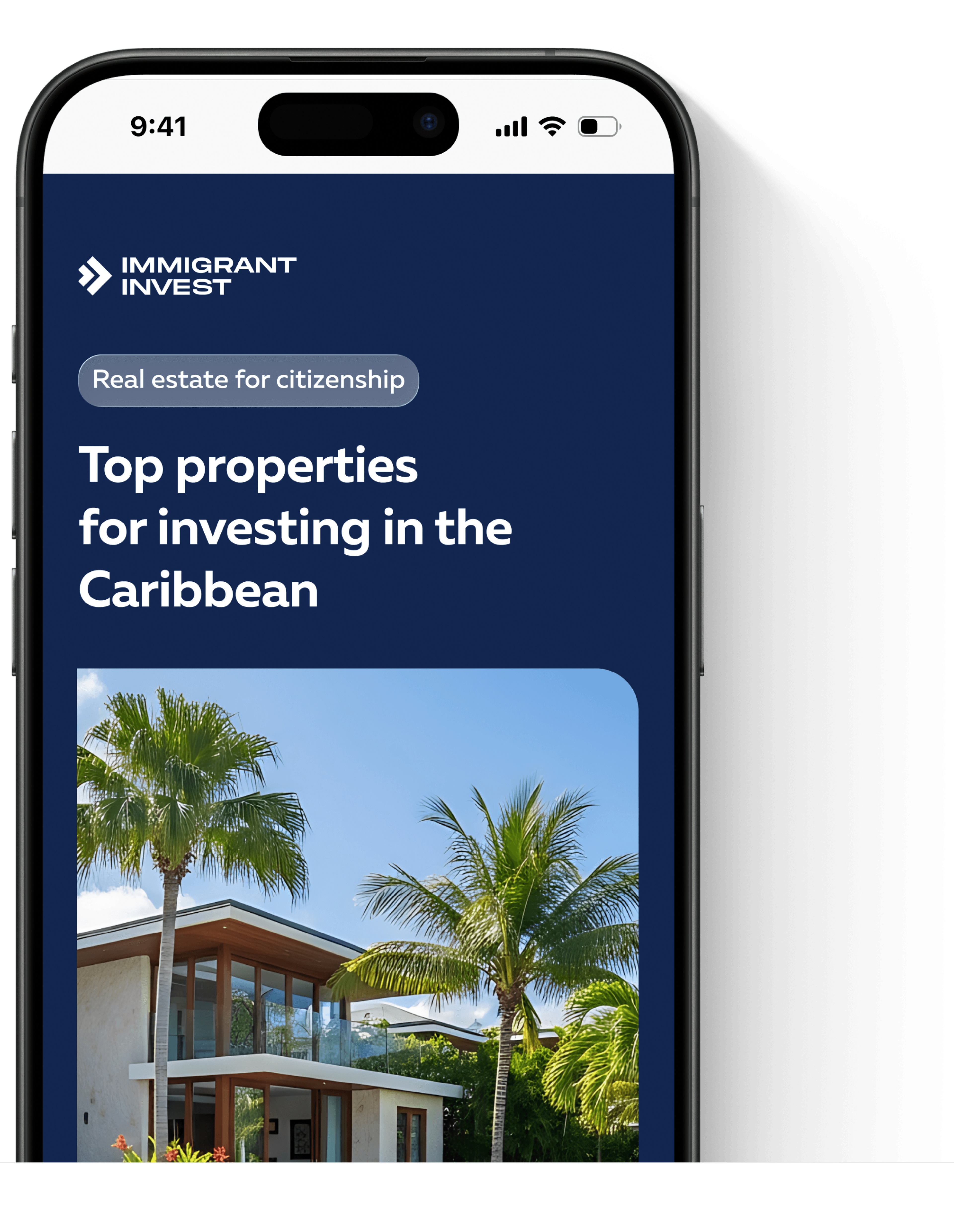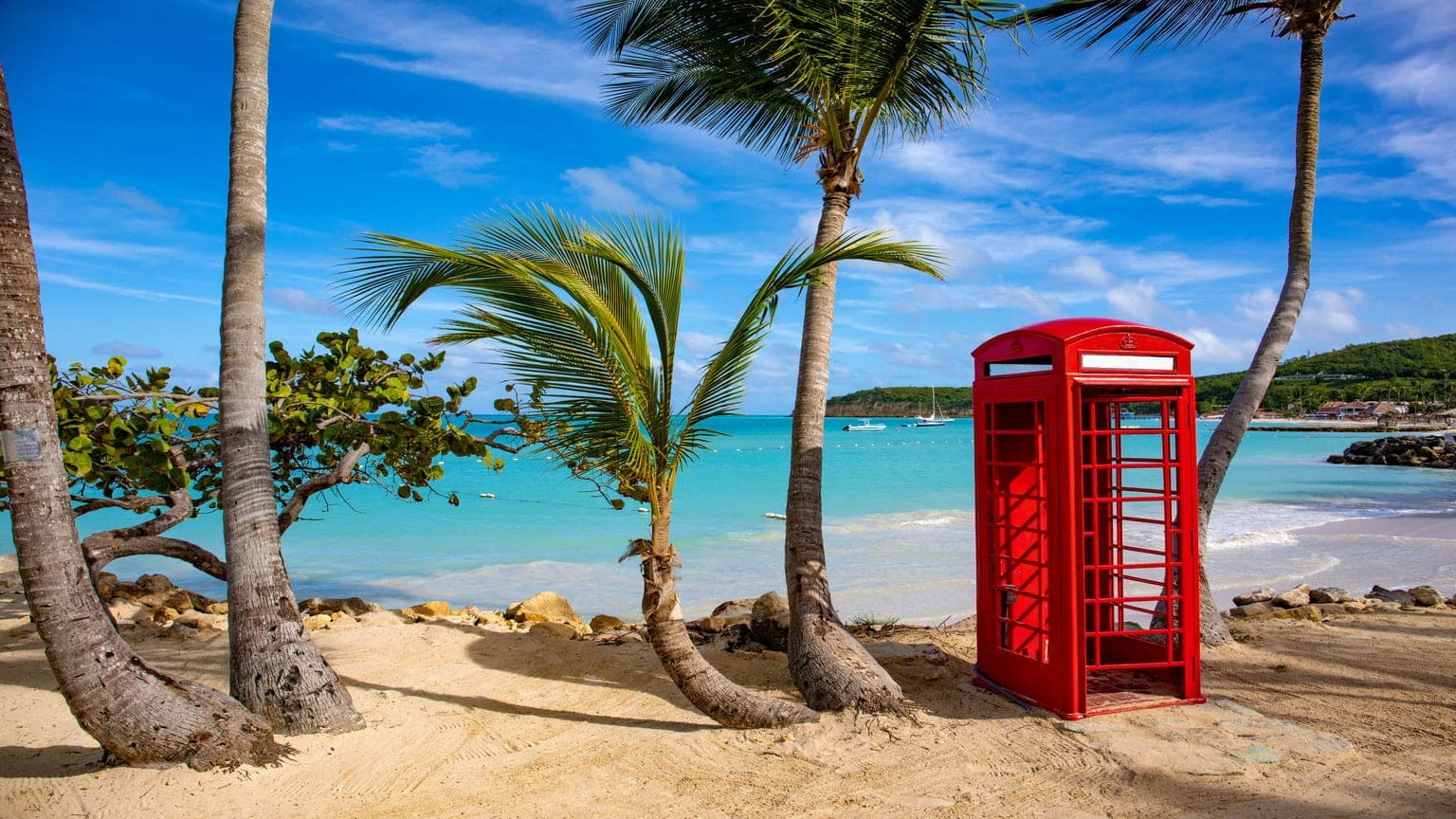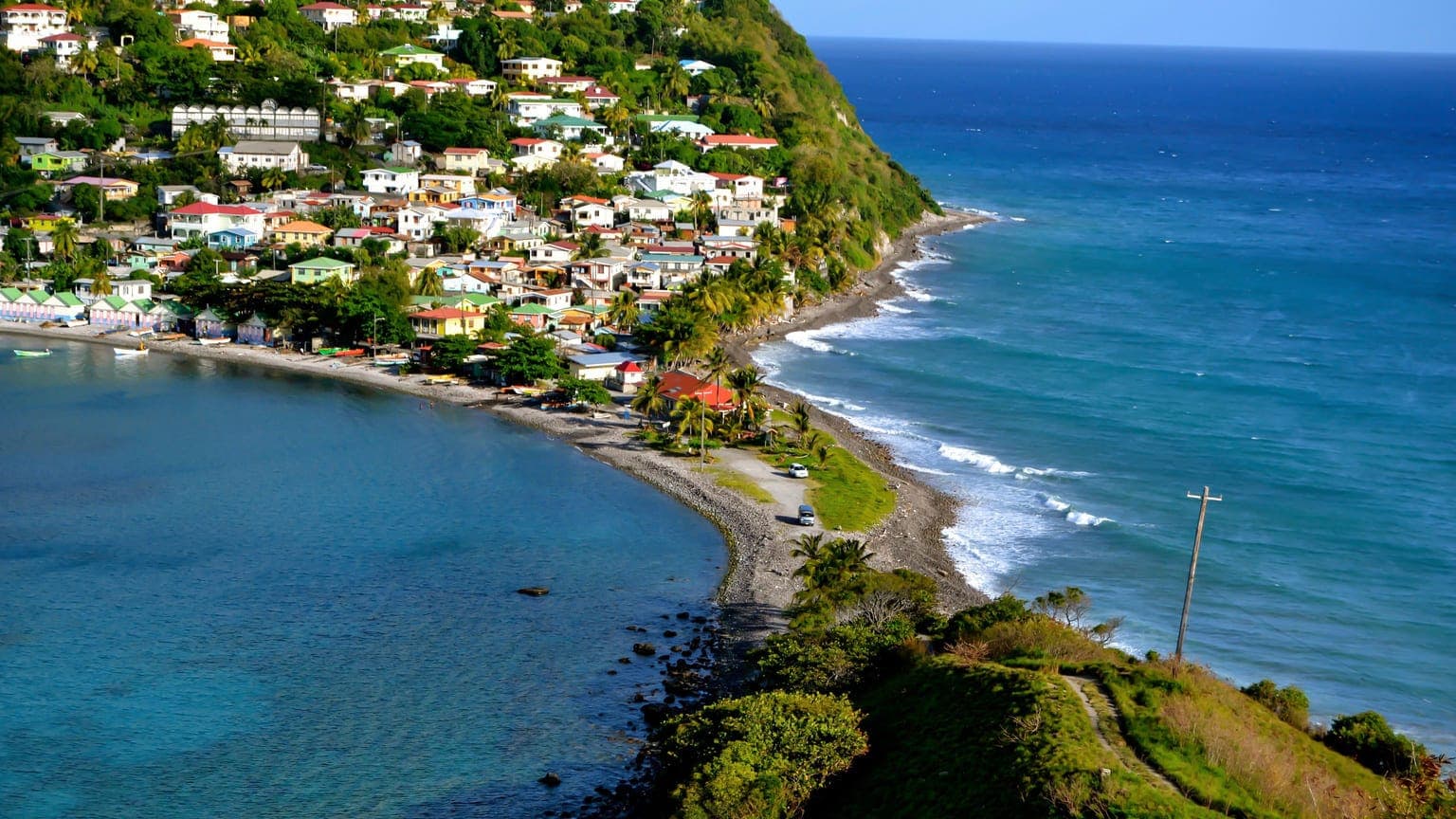Summary
Dominica is one of the countries in the Caribbean that offers second citizenship for real estate investment.
Most wealthy people applying to Immigrant Invest to participate in the Dominica program think it is about buying villas and apartments. However, the program limits the cost and choice of objects.
Dominica citizenship by investment in real estate: terms of the program
The Dominica citizenship by investment program offers to invest $200,000 in real estate, regardless of the composition of the family.
Dominica citizenship by investment in real estate is a refundable option. Under the terms of the citizenship program, it is possible to return investments in real estate, that is, to sell the property, after three years after obtaining citizenship.
If the investor sells the property after five years, the property can re-participate in the citizenship program. This increases the liquidity of the asset.
In our experience, investors participating in the Dominica real estate citizenship program under the real estate option do not sell assets until after five years.
The terms of the Dominica citizenship by investment program are described in section 101 of the Dominica Constitution and sections 8 and 20 of the Citizenship Law.
The process of obtaining citizenship under the program takes at least 6 months.
The law does not require investors to stay in the country either before or after obtaining a passport. Therefore, participation in the program is entirely remote.
Together with the investor, the following can participate in the program:
-
spouse;
-
children under 30;
-
parents and grandparents over 65.
To participate in the Dominica citizenship by investment program, foreigners can also make a non-refundable contribution to the Dominica Economy Diversification Fund. The minimum contribution amount is $200,000. The investment threshold depends on the composition of the investor’s family.
The money from the fund goes to social programs such as housing and medicine.

Practical Guide
Your key to Caribbean citizenship: curated real estate for $200k+
Additional costs under the Dominica citizenship program by investment in real estate
A government fee is charged when buying real estate under the real estate citizenship program. Its amount depends on the number of applicants for citizenship:
-
$75,000 — for a single investor;
-
$100,000 — for a married couple;
-
$100,000 — for a family of 3 or 4.
Starting from the 5th applicant, an additional $25,000 is paid for each family member under 18 and $40,000 for each family member over 18.
The Due Diligence fee is a mandatory additional cost for participation in the program. This is the main stage of the citizenship program, in which the investor and his family members undergo Due Diligence.
For the investor, the fee for Due Diligence is $7,500, and for other family members over 16 years old, it is $4,000. There is no fee for children under 16 years of age.
The processing of documents is $1,000 for the whole family.
There are also fees for:
-
issuance of certificates of naturalisation — $500 per person;
-
issuance of passports — $300 per person;
-
a mandatory interview — $1,000 per interview. All applicants over 16 can participate in one interview.
There is no tax on the real estate sale or purchases. The owner doesn't pay property tax, but a municipal tax of 1.25% is levied. The seller of real estate pays a stamp duty of 2.5% of the transaction amount.
What properties do investors choose to buy?
The Government approves all properties eligible for the citizenship program in Dominica. This approach limits the choice of investors but, on the other hand, protects against scammers.
Approved projects are objects of tourism infrastructure, usually hotel complexes. Eight years ago, only one project was approved for participation in the program, and now there are ten.
An investor can purchase a share, an apartment or a villa in a hotel. Buying a share is the least expensive option; it costs $200,000 or more. As an investor, you get the right to stay at the hotel for free for 1—2 weeks a year.
If you buy an apartment or a villa, you can keep it or rent it out. The problems of maintenance or finding tenants will not fall on you, as the management company will take care of this.
Immigrant Invest real estate experts study information about all citizenship program projects. Lawyers check the purity of contracts and assess risks. This is how Immigrant Invest clients receive proposals for the best and most reliable projects.
4 projects for real estate investment in Dominica
We talk about the best projects approved by the Dominica government for participation in the citizenship program.
1. Five-star resort complex managed by Autograph Collections . The complex is located on one of the most beautiful beaches of Picard Beach in Portsmouth, on the northwest coast of Dominica.
Investors can purchase shares or apartments with one or two bedrooms. The cost of a share in the project is $220,000, and the cost of apartments is $320,000 or more.
The estimated annual yield is 3.5%.
The commissioning of the hotel is scheduled for the third quarter of 2022. At the construction time, the developer estimates the return on investment at 2%. Since the opening, the yield will increase to 3.5%.
All properties purchased in whole or part will be managed by the resort and will not be available for permanent residence. Investors will be able to stay at the hotel free of charge for one week a year.
**2. **Share in a five-star hotel managed by Intercontinental . The project is a secluded resort operated by hotel group Intercontinental that ranks among the best in its class in the Caribbean. The resort is surrounded by the picturesque Cabrits National Park, which is widely known for its natural beauty.
This is a 151-room resort with breathtaking panoramic views of the Caribbean Sea, amenities such as a spa, 4 restaurants and bars, an art center, two floodlit tennis courts, 4 swimming pools, a gym, a conference room and weddings.
Investors are invited to purchase a share worth $220,000.
**3. **A coastal resort managed by Hilton consists of a hotel with 73 rooms and villas with one, two or three bedrooms with a full range of services. The complex is situated on a picturesque sea cliff, and its guests can access two secluded beaches.
The infrastructure includes a spa and wellness centre, a restaurant, a swimming pool, shops, and parking.
Investors may buy shares for $220,000 each. In addition, they’ll get a Hilton gold status and points worth about $15,000, which can be spent on staying in Hilton hotels worldwide.
The return on investment will be around 3—7% per annum.
4. The hotel complex of eco-cottages is located in the rainforest, in the vicinity of the village of Laudat, Roseau Valley. It is home to the Mo e Trois Pitons National Park, a UNESCO World Heritage Site.
Seventy-two cottages and swimming pools are being built on the territory of the hotel. Investors will be able to become equity participants in the project. The value of one preferred share is $200,000.
The developer estimates the investment yield after putting the hotel into operation at 3% per annum. The opening of the hotel is scheduled for November 2022.
The hotel started operating in December 2023. The investment yield is 3% per annum.
The investor and his family members will be able to stay at the hotel for one week during the high season or two weeks during the low season. At the same time, seasonality in the Caribbean Islands is weakly expressed, and you can relax there all year round.
Step-by-step procedure to obtain Dominica citizenship by investment in real estate
Obtaining Dominica citizenship by real estate investment takes at least 6 months and requires the following steps to be completed remotely.
Preliminary Due Diligence Check
The Immigrant Invest compliance department checks investors’ biography before signing a contract. Anti-Money Laundering Officer identifies potential risks that may lead to the rejection of the application. This is how Immigrant Invest reduces the risk of refusing an application for citizenship by investment to 1%.
The Immigrant Invest compliance department checks investors’ biography before signing a contract. Anti-Money Laundering Officer identifies potential risks that may lead to the rejection of the application. This is how Immigrant Invest reduces the risk of refusing an application for citizenship by investment to 1%.
Choosing property
The investor chose shared ownership in the hotel. Under the law, the return on investment when buying property in Dominica is three years. But for real estate, which is used to obtain investment citizenship, the ownership should be kept for five years.
The investor chose shared ownership in the hotel. Under the law, the return on investment when buying property in Dominica is three years. But for real estate, which is used to obtain investment citizenship, the ownership should be kept for five years.
Sending documents to the CBI Unit
Investors bring documents according to the list. Immigrant Invest lawyers get copies notarized, apostilled, and submitted for consideration to the Dominica government.
The Dominica Citizenship by Investment Unit (CBIU) accepts the applications and starts the Due Diligence checks.
Investors bring documents according to the list. Immigrant Invest lawyers get copies notarized, apostilled, and submitted for consideration to the Dominica government.
The Dominica Citizenship by Investment Unit (CBIU) accepts the applications and starts the Due Diligence checks.
Approving application
Immigrant Invest lawyers receive a response about investors’ participation in the real estate citizenship program. Approval of the program is the basis for the transfer of investments.
Immigrant Invest lawyers receive a response about investors’ participation in the real estate citizenship program. Approval of the program is the basis for the transfer of investments.
Purchasing real estate
Investors’ expenses when choosing to buy a share in real estate included the cost of the object, Due Diligence check, the state and courier fees.
Investors’ expenses when choosing to buy a share in real estate included the cost of the object, Due Diligence check, the state and courier fees.
Getting passports
When the bank confirmed the investment, the CBI printed the passports and certificate of naturalisation. Later, Immigrant Invest lawyers delivered a new passport of a Dominican citizen to the investor.
When the bank confirmed the investment, the CBI printed the passports and certificate of naturalisation. Later, Immigrant Invest lawyers delivered a new passport of a Dominican citizen to the investor.
What are the benefits of Dominica citizenship by real estate investment?
The Dominica government selects the best real estate projects to participate in the program. Real estate investments start at $200,000, which is a small investment compared to European citizenship or residency programs.
Under the Portuguese residence permit program, you need to invest at least €250,000. At the same time, a residence permit of an EU country does not give freedom of visa-free travel around the world, unlike citizenship.
Citizenship of Dominica provides many advantages:
-
You can visit more than 145 countries without a visa, including the Schengen countries, Singapore, Hong Kong, and China.
-
As a citizen of Dominica, you will be able to obtain a US visitor visa for ten years. You can apply for a visa at the nearest US consulate or visa centre.
-
With a Caribbean passport, it is much easier to become a client of a bank that operates in the EU. An account in a European bank allows you to have savings.
-
Dominica has a loyal taxation system. For example, there are no taxes on capital gains or inheritance.
You acquire a liquid asset by participating in the Dominica citizenship by real estate investment program. The developer will manage your property, and the investment will be returned after five years.

Elena Ruda,
Chief Development Officer at Immigrant Invest
Dominica citizenship is hereditary. Children born after the investor has obtained citizenship automatically qualify as citizens. This extends to their children and continues through all succeeding generations.
How popular is Dominica citizenship by investment?
Dominica’s citizenship by investment program is among the most sought-after in the Caribbean. Between 2018 and 2022, the country issued 34,596 passports to investors and their family members.
For comparison, St Kitts and Nevis granted 35,577 passports over a longer period, from 2015 to 2022. During the same period, Antigua and Barbuda issued 7,205 passports, while Grenada granted 6,479.
In 2023 alone, Dominica approved 9,539 passports for investors and their relatives. By mid‑2024, another 5,484 passports had been issued.
From 2015 to 2022, Dominica received 13,161 investor applications. In 2023, this figure reached 4,068, while 2,981 applications were submitted in the first half of 2024.

Comparison of Dominica citizenship with other Caribbean passports
If you consider obtaining a Dominica passport, these materials will help you understand how it compares to other Caribbean passports, highlighting the unique benefits and requirements of each:
Key takeaways about Dominica citizenship by property investment
-
Dominica citizenship may be obtained by investing at least $200,000 in government-approved real estate. Properties can be resold after three years or after five years to re-enter the program and ensure liquidity.
-
The process takes at least 6 months and can be completed remotely. There is no requirement to reside in Dominica before or after obtaining citizenship.
-
In addition to the real estate investment, applicants pay government fees, Due Diligence fees, and administrative costs. The total cost varies depending on family size and the chosen real estate project.
-
The government carefully selects real estate projects to protect investors, primarily approving luxury hotel developments managed by renowned brands such as Hilton, InterContinental, and Autograph Collection.
-
A Dominica passport grants visa-free access to 145 countries, including the Schengen Area, Singapore, and China. The tax system is favourable, with no capital gains, inheritance, or wealth tax.
Immigrant Invest is a licensed agent for citizenship and residence by investment programs in the EU, the Caribbean, Asia, and the Middle East. Take advantage of our global 15-year expertise — schedule a meeting with our investment programs experts.



















